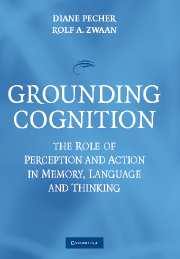Book contents
- Frontmatter
- Contents
- List of Contributors
- 1 Introduction to Grounding Cognition: The Role of Perception and Action in Memory, Language, and Thinking
- 2 Object Concepts and Action
- 3 Constraints on Spatial Language Comprehension: Function and Geometry
- 4 Embodiment in Metaphorical Imagination
- 5 Passionate Thoughts: The Emotional Embodiment of Moral Concepts
- 6 Grounding Language in Bodily States: The Case for Emotion
- 7 Situating Abstract Concepts
- 8 Dynamicity, Fictivity, and Scanning: The Imaginative Basis of Logic and Linguistic Meaning
- 9 The Emergence of Grammar from Perspective
- 10 Embodied Sentence Comprehension
- 11 On the Perceptual-Motor and Image-Schematic Infrastructure of Language
- 12 Connecting Concepts to Each Other and the World
- Author Index
- Subject Index
- References
12 - Connecting Concepts to Each Other and the World
Published online by Cambridge University Press: 22 July 2009
- Frontmatter
- Contents
- List of Contributors
- 1 Introduction to Grounding Cognition: The Role of Perception and Action in Memory, Language, and Thinking
- 2 Object Concepts and Action
- 3 Constraints on Spatial Language Comprehension: Function and Geometry
- 4 Embodiment in Metaphorical Imagination
- 5 Passionate Thoughts: The Emotional Embodiment of Moral Concepts
- 6 Grounding Language in Bodily States: The Case for Emotion
- 7 Situating Abstract Concepts
- 8 Dynamicity, Fictivity, and Scanning: The Imaginative Basis of Logic and Linguistic Meaning
- 9 The Emergence of Grammar from Perspective
- 10 Embodied Sentence Comprehension
- 11 On the Perceptual-Motor and Image-Schematic Infrastructure of Language
- 12 Connecting Concepts to Each Other and the World
- Author Index
- Subject Index
- References
Summary
Consider two individuals, John and Mary, who each possess a number of concepts. How can we determine that John and Mary both have a concept of, say, Horse? John and Mary may not have exactly the same knowledge of horses, but it is important to be able to place their horse concepts into correspondence with one another, if only so that we can say things like, “Mary's concept of horse is much more sophisticated than John's.” Concepts should be public in the sense that they can be possessed by more than one person (Fodor, 1998; Fodor & Lepore, 1992), and for this to be the possible, we must be able to determine correspondences, or translations, between two individuals' concepts.
There have been two major approaches in cognitive science to conceptual meaning that could potentially provide a solution to finding translations between conceptual systems. According to an “external grounding” account, concepts' meanings depend on their connection to the external world (this account is more thoroughly defined in the next section). By this account, the concept Horse means what it does because our perceptual apparatus can identify features that characterize horses. According to what we will call a “Conceptual web” account, concepts' meanings depend on their connections to each other. By this account, Horse's meaning depends on Gallop, Domesticated, and Quadruped, and in turn, these concepts depend on other concepts, including Horse (Quine & Ullian, 1970).
Information
- Type
- Chapter
- Information
- Grounding CognitionThe Role of Perception and Action in Memory, Language, and Thinking, pp. 282 - 314Publisher: Cambridge University PressPrint publication year: 2005
References
Accessibility standard: Unknown
- 4
- Cited by
